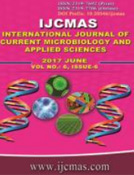


 National Academy of Agricultural Sciences (NAAS)
National Academy of Agricultural Sciences (NAAS)

|
PRINT ISSN : 2319-7692
Online ISSN : 2319-7706 Issues : 12 per year Publisher : Excellent Publishers Email : editorijcmas@gmail.com / submit@ijcmas.com Editor-in-chief: Dr.M.Prakash Index Copernicus ICV 2018: 95.39 NAAS RATING 2020: 5.38 |
The effect of Engyodontium aranearum, a nematode egg parasitic fungus, alone and along with other biocontrol agents, organic amendment and carbofuran was evaluated in pot culture infested with Meloidogyne incognita on tomato under pot and field condition for two seasons. Plant growth parameters, fruit yield, root population and final nematode population were determined at harvest. The results revealed that all the treatments were effective in increasing the plant growth with significant reductions in nematode populations. Among the treatments, the combined soil application of E. aranearum with P. flouroscens each at 2.5 kg/ha increased the tomato yield by 55.68 per cent under pot culture conditions and 41.62 per cent under field conditions. The soil nematode population was decreased by 54.74 per cent under pot culture and 60.75 under field conditions. There was also significant reduction in nematode population in roots.
 |
 |
 |
 |
 |